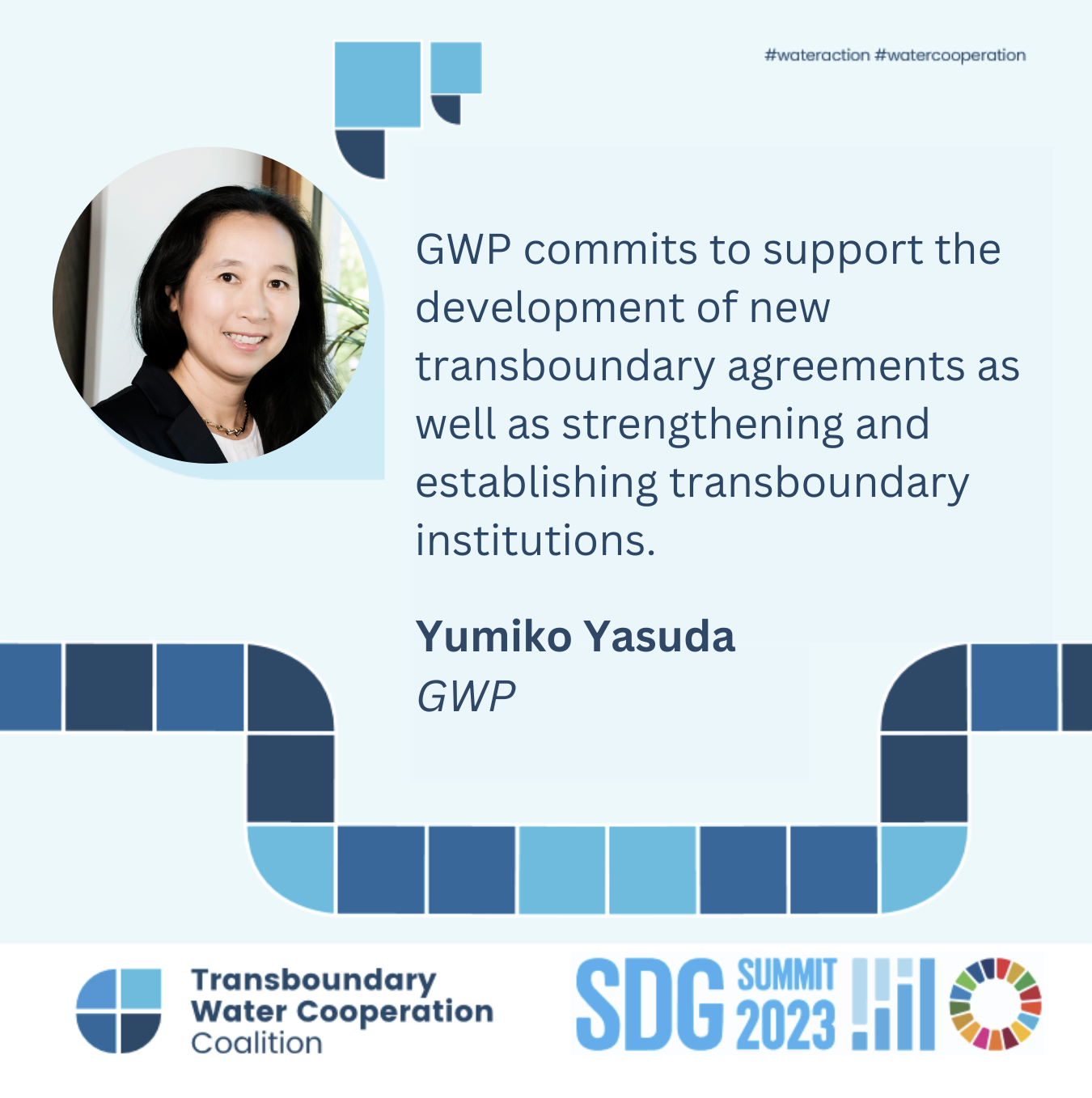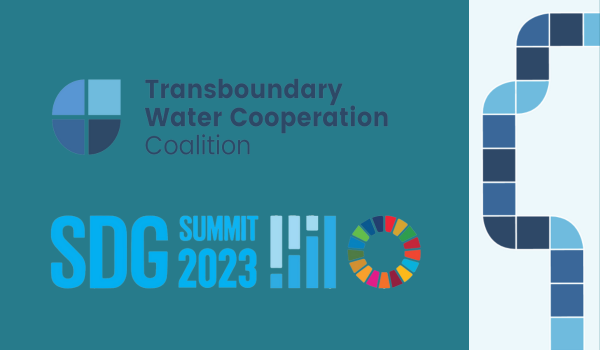Transboundary waters account for 60% of the world’s freshwater, more than 3 billion people depend on them and cooperation is central to achieving #SDG6 and the entire 2030 Sustainable Development Agenda. Read the full call to action below.

A call to action from the Transboundary Water Cooperation Coalition
Transboundary waters account for 60 per cent of the world’s freshwater flows and more than 3 billion people depend on them. In addition, climate change exacerbates issues of both water quantity and quality. Cooperation over transboundary surface and groundwater is not only central to SDG target 6.5, and other SDG 6 targets, but is essential to achieve the 2030 Sustainable Development Agenda:
- Water cooperation is crucial for food security (SDG 2): Cooperation can lead to better management and allocation of water resources, ensuring that countries use water more efficiently and sustainably for agricultural production but also fisheries, thus improving livelihoods. Joint projects like reservoirs or irrigation schemes can optimize water availability and use for agriculture in multiple countries.
- Water cooperation leads to improved health (SDG 3): Cooperation can lead to better water quality management, reducing the risk of waterborne diseases, and to emergency preparedness, decreasing loss of life and the negative health impacts from water-related disasters.
- Cooperation is crucial for energy security (SDG 7): Water plays an indispensable role in energy production, especially in hydroelectric power generaon, cooling in thermal and nuclear power plants and in the production, extraction and processing of alternative sources of energy. When countries share water resources, cooperation becomes pivotal for ensuring uninterrupted energy supplies.
- Water cooperation is crucial for protection of biodiversity (SDG 15): Water systems, from rivers, lakes and groundwater to wetlands and estuaries, are vital habitats that sustain a diverse array of species and habitats. When water resources cross borders, joint management and cooperation become essential to maintain flows and clean water ensuring that these habitats remain vibrant and protected, including from accidental pollution.
- Water cooperation is crucial for climate action and ambition, resilience and disaster risk reduction (SDG 13): Transboundary cooperation makes adaptation more effective by enabling the pooling and sharing of data and thus increasing certainty and resilience, by enlarging the planning space and by preventing negative impacts of unilateral measures.
- Water cooperation is imperative for healthy oceans (SDG 14). Effective coordination between countries sharing transboundary waters is a prerequisite to sustain source-to-sea flows and overall ecosystem health, and to prevent and reduce ocean pollution, including plastic pollution.
- Water cooperation supports economic development and regional integration (SDGs 1, 8, 9 and 11): Cooperation efforts can lead to shared infrastructure projects, which can foster regional economic integration and growth. Cooperation, e.g. through treaties, can create more favorable and secure conditions for investors.
- Water cooperation promotes peace (SDG 16): Water can serve as a conduit for diplomacy and collaboration. Cooperation over water often facilitates cooperation in other areas. Transboundary basin organizations are “agents of peace” surviving conflicts or even wars and promoting reconciliation and trust.
However, we are lagging behind. At the halfway point of the 2030 Agenda, the world is not prepared to deal with current and future challenges associated with transboundary water. This is demonstrated by the monitoring of SDG indicator 6.5.2, which indicates that cooperation in most transboundary basins is not adequate and progress is too slow. Only 24 countries reported that all the rivers, lakes and aquifers they share are covered by operational arrangements for cooperation. Without cooperation in shared basins the world will fall short to address the poly-crises of climate, biodiversity loss and pollution.
The 2023 UN Water Conference highlighted the importance of transboundary water cooperation, as demonstrated in plenary statements of more than 70 Member States and through over 40 commitments in the Water Action Agenda by Governments, international organizations, academic institutions, river basin organizations and civil society to advance transboundary water cooperation.
Member States and all relevant stakeholders need to act to protect and better manage transboundary waters in all basins and connected coastal systems worldwide. This will not only make our world more water-secure, but also make strides towards the achievement of the entire 2030 Agenda.
We call for the following actions to advance transboundary water cooperation:
- Create enabling legal, policy and institutional environments for equitable and effective cooperation across sectors and borders as well as economic, financial and political incentives
- Develop and strengthen agreements between riparian countries, and set up and increase the impact and effectiveness of existing basin and aquifer organizations, notably by making best use of the 1992 UN Water Convention, the 1997 UN Watercourses Convention and the Draft Articles on the Law of Transboundary Aquifers
- Strengthen the scientific and information base for decision-making by improving the technical-political interface, enhancing hydrometeorological monitoring networks, supporting data, information and knowledge generation and exchange, and adopting open data and information exchange policies
- Enhance capacity at all levels to manage shared water resources in an integrated, sustainable and inclusive manner by increasing education and training, as well as through technical assistance and the sharing of best practices
- Increase international and national financing for transboundary water cooperation, strengthen the financial sustainability of transboundary basin organizations, and increase public and private investments in transboundary basins, such as in joint planning, investment plans and infrastructure, and nature-based solutions
- Use transboundary water cooperation as a vehicle for fostering regional integration, building sustainable peace, strengthening resilience to climate change and addressing country fragility
- Elevate transboundary water cooperation’s prominence globally through its inclusion in political declarations, global processes, national strategies, regional frameworks and integration processes and Conventions.
The Transboundary Water Cooperation Coalition is a diverse, multi-stakeholder coalition of actors made up of the following countries: Chile, Dominican Republic, Estonia, Finland, France, Germany, Hungary, Iraq, Kazakhstan, Morocco, Namibia, The Netherlands, Panama, Senegal, Slovenia, Switzerland, Uganda; the European Union as a regional integration organization; as well as and the following organizations: ESCWA, Global Environment Facility (GEF , Inter-American Development Bank (IaDB), Organization of American States (OAS), UNCDF, UNDP, UNECE, UNEP, UNESCO, World Bank , Centro Regional para la Gestión de Aguas Subterráneas en América Latina y el Caribe (CeReGAS), EcoPeace Middle East, Geneva Water Hub, Global Water Partnership (GWP), International Groundwater Resources Assessment Centre (IGRAC), IHE Delft Institute for Water Education, International Network of Basin Organizations (INBO), IUCN, Stockholm International Water Institute (SIWI), University of Kinshasa, Water Diplomacy Center/Jordan University of Science and Technology.

